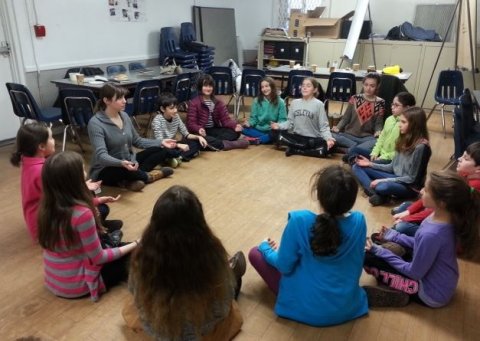Camp/Retreat Model: Kesher Mini-Camp
Village Temple, New York, NY

Model Summary:
Village Temple Kesher Mini-Camp is a day camp inspired multi-age model of learning that takes place when secular school and Hebrew school are not in session. The goal of this model is to create hands-on experience learning that allows students of different ages to connect to each other within a Jewish educational context. Kesher Mini-Camp works to provide an environment where learners explore and build Jewish Identity and connections to each other and their temple. This model also allows for teachers and teens to serve as role models beyond the classroom.
Who are the Learners?
The learners are elementary and middle school age students, post-b’nai mitzvah students (serving as madrichim/counselors), and classroom teachers as facilitators for the camp and trainers for the madrichim.
Who are the Educators/Learning Facilitators?
Classroom teachers, post-b’nai mitzvah madrichim and the educational director
When Does the Learning Happen?
As an all-day mini-camp on days when secular school is not in session (Election Day, Veterans Day) and as an afterschool Hebrew School through mid-June.
Where Does the Learning Happen?
Learning takes place all over the building. Village Temple transforms the building into a place where learning and community building can happen anywhere.
What is the Learning? How is it Designed?
-
As an after school or all day mini-camp, this creates an additional opportunity for involvement and connection with the Village Temple.
-
Learners continue exploration of values, ethics, etc. that they might engage in on other days, but in a more interactive, relationship focused, and experiential way.
-
The learning is linked to the content of the rest of the year.
- Model meets the learners where they are and gives learners opportunities to explore other connections to the community and to form new relationships.
What Were You Trying to Achieve with this Model?
The Village Temple Kesher Mini-Camp resembles a day camp. The following aspects make it unique in a congregational setting:
- The content and programming is designed and implemented by post-b'nai mitzvah religious school students, enrolled in a special madrich (counselor) program. This program is designed to train the teens and empower them to lead their younger Hebrew school peers.
- The Village Temple Kesher mini-camp brings together Hebrew school students of all ages in a shared, content-rich camp-like experience when Hebrew school and secular schools are not in session. This allows Village Temple to strengthen relationships amongst students of all ages and encourage the teens and parents to strengthen their ties with their congregation.
Key First Steps and Recruitment Plan:
-
Village Temple reaches out to existing families through regular communications, primarily email and flyers. Participants are mainly learners already in attendance at the Hebrew School. Faculty members also used their communications and one-on-one conversations with parents to encourage parents to send children to the Mini-Camp.
- Village Temple shares successes by making presentations to the temple board, sharing information with the larger community via the community newsletter, and using public gatherings to advertise and announce what has been successful and what’s happening generally with synagogue education.
Role of governance and Clergy:
The Rabbi does not play a role.
Hiring Needs:
-
The educator sets the stage for the teachers, the teachers support the madrichim and the madrichim work with the learners.
- Teachers should have a background in informal education or camping, as well as the ability to work with teenagers and/or experience with post-b’nai mitzvah kids. Teachers need to have flexibility and the readiness to own the project. Village Temple looks for teachers who have an engaging, inspiring, warm personality; someone who inspires teens to want to do the work.
Relationship of Model to Congregational Learning System:
Supplements and supports the traditional model.
How Do You Describe Your Congregation?
Reform, 250 families, 140 students in education program, 1 rabbi, 2 cantorial soloists, Education Director, limited support staff, board with co-presidents and an Education Leadership Team. Village Temple’s overall educational vision is to instill in their learners a lifelong love and commitment to Jewish religious practice, ethics, the Jewish People, and the State of Israel. This vision permeates the education that is developed for this model.

